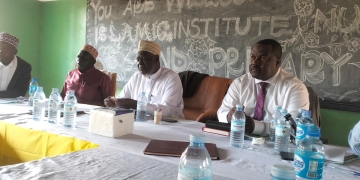Field visit in Ghana
Stakeholders advocating for transparency and accountability in the infrastructure sector say that to address the risks that lead to corruption in government infrastructure projects, governments and their respective entities should embrace opening up infrastructure delivery processes to public scrutiny. In East Africa as per the recent 2024/25 FY budgets, all the EAC member states have a high commitment to foster infrastructure development in roads, railways, seas, airports among others.
Ms. Olive Kabatwairwe, the Africa Regional Manager and Learning Lead for CoST – the Infrastructure Transparency Initiative emphasizes the need for transparency and accountability in the infrastructure sector across the region.
The infrastructure sector in Africa takes the most significant percentage of budgets. Returns on investments are not often realised because the sector has been stalled by corruption, mismanagement, and inefficiency. Infrastructure governance is key and significant for all stakeholders. We need good governance in the industry to deliver quality projects that meet the social and economic needs and quality of life of people everywhere. Therefore, incremental progress is only possible when countries and stakeholders take accountability and transparency initiatives and mechanisms for establishing stronger foundations for delivering quality infrastructure more critically.

No matter the amount of money, there must be high-quality, efficient, and effective infrastructure. With climate change, we need to build infrastructure that is climate resistant. We are looking at efforts to reduce greenhouse gas emissions to ‘net zero’ by around 2050. CoST is an approach that can be used to advance this dimension, as noted by the UK’s FCDO, endorsed by FIDIC, CICA among other international bodies. Citizen engagement and access to information are critical tenets for realising better value infrastructure; these can be successful if governments have implemented platforms, systems, processes and capacities to deliver this.
Africa needs USD 93 billion annually for infrastructure development, but only USD 45 billion is being mobilised, and each state needs at least 7.1% of the GDP for infrastructure development, while the IMF estimates that over 50% of investment in infrastructure in Africa is lost due to corruption, mismanagement and inefficiency. Under such complicated and difficult contexts, incremental progress is only possible when countries and stakeholders take accountability and transparency initiatives and mechanisms, for establishing stronger foundations for delivering quality infrastructure more critically.
Countries like Uganda alone spend at least 32% (UIA) of their annual budget on infrastructure development, money of which includes loans, and grants. The World Bank estimates that Ethiopia for instance spends 10% of its GDP on infrastructure, Malawi approximately 28% of the GDP, Ghana 7.5% of the GDP, Mozambique 10% of its GDP goes to infrastructure development, while Nigeria spends approximately 22% of its GDP on infrastructure development. Other countries like Kenya and Zambia spend approximately 20% of their GDP on infrastructure development, and countries like South Africa wish to increase their infrastructure spending from 3.8% to 10% by 2030. With these growing percentages of priorities into the sector, it is therefore critical that these investments are accounted for, and the public is informed of where and how the investments into the sector have been use

Olive says that in Africa, transparency and accountability on investments into the infrastructure sector remains a daunting challenge. Countries that have embraced transparency safeguards such as CoST tools including the Open Contracting for Infrastructure Transparency (OC4IDS) are numerable to 6 including Nigeria, Ghana, Ethiopia, Uganda, Malawi and Mozambique, of which these, are still progressive regarding the level of transparency in the sector. This is a big challenge in the region, if we must fight corruption risks, Africa member states must step up to aggressively embrace infrastructure transparency. We have countries like Malawi that are progressive having the President as the Champion of CoST in the country, who continues to improve the legal framework for transparency in the sector, helping improve the level of data published, Malawi now has close to 700 projects published in nearly one year. However, the journey is still way long, when we look at the number of projects governments deliver compared to those that are being published to facilitate social accountability stakeholders to engage with and hold duty bearers to account, we need more infrastructure data. When we compare African countries with countries like Guatemala and Panama that publish data on over 1000 projects a month, we need concerted efforts in a multi-stakeholder working approach to level up to such countries

Disclosure is very helpful for government, private sector and citizens, with more data, using the CoST approach, governments would be able to understand the trends in regard to project status, procurement inconsistencies, delays in payments, and other red flags, such as number of bids per tender, most frequent bidders, most contracted or less contracted companies, contracted companies that have been black listed among others. This data would be accessed automatically to facilitate real time decision making. Businesses on the other hand would quickly access data on available business opportunities and make informed decisions on where to invest the available resources. And the CSOs and citizens need the data to monitor government projects playing a supplementary role.
Governments that have so far embraced the CoST approach and tools have expressed high level political and technical will, and this is commendable. The challenge with realizing infrastructure transparency in the region remains on the lack of compliance with transparency commitments across the procuring entities. And yet, most entities and their departments face gross challenges related to access to project and contract data even within themselves. Governments need to ensure that there are incentives, resources for officials to publish data on open platforms using open data formats and put in place sanctions for non-compliance.
The platforms do exist in countries or states where governments have joined CosT, and CoST continues to support interested governments, entities, states and major projects to publish infrastructure data and design such platforms. We have supported all the current members of CoST in Africa to put in place national level information platforms for infrastructure projects, the challenge is on entities not populating data through these platforms

Experience has shown that, when governments publish more infrastructure data, citizens regain interest and build trust with what is being done in the sector. Engagements with a local government in Uganda revealed how providing citizens with information on projects through community Barazas helped reduce the number of questions the district engineer always had to answer in his office. Opening up helped the district to rebuilt trust, and secure land without compensation from citizens to enlarge local community roads, helping communities access better roads, and saving government huge amounts meant for compensation, which were not available











